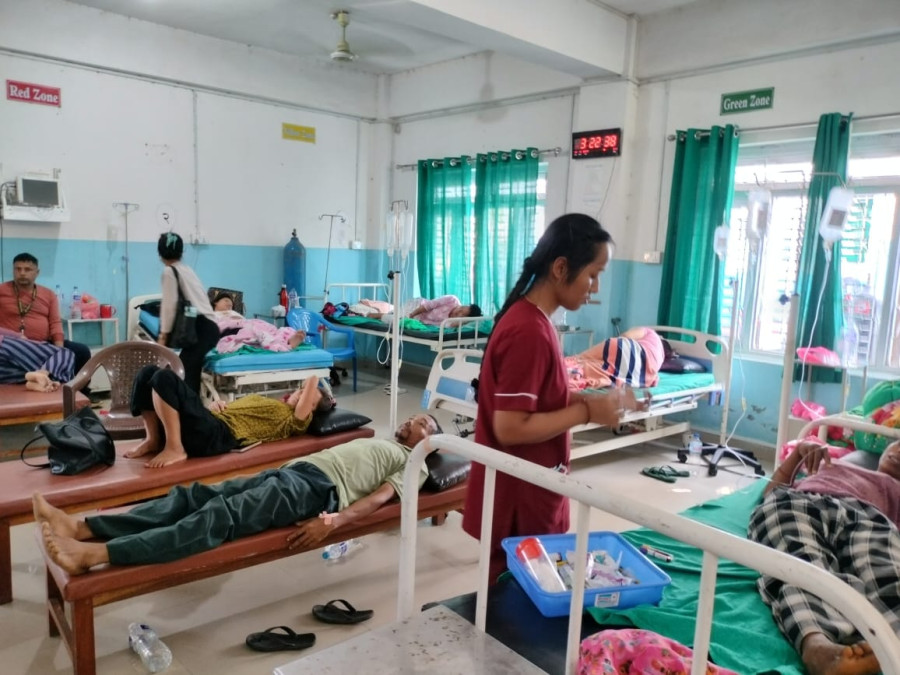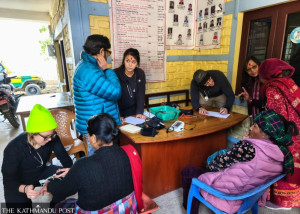Health
Apathy to take preventive measures blamed for an exponential rise in dengue cases
Health workers demand testing kits and essential medicines instead of directions.
Arjun Poudel
The 500 rapid diagnostic test kits supplied by the Epidemiology and Disease Control Division to the Anbukhaireni Rural Municipality of Tanahun two weeks ago were used up within two days.
Along with the test kits, the division also issued directives to launch a search-and-destroy drive, mobilise female community health volunteers, and deploy social workers to destroy the breeding grounds for the disease vectors.
Despite the rural municipality grappling with a massive dengue outbreak, with over 1,000 positive cases in a single ward within a month, the federal government's central disease control body has yet to dispatch an expert team to conduct vector surveillance. Health workers at the local unit said that they expect federal agencies to monitor health facilities overwhelmed with infected patients and ensure that preventive measures have been properly enforced.
“More than the directives, we need test kits, essential medicines and health workers to care for the patients in our hospitals,” Agam Raj Upadhyaya, health coordinator of the rural municipality, told the Post over the phone from Anbukhaireni. “Neither the Ministry of Health and Population of the federal government nor the agencies under the provincial government have taken the issue seriously, even after a massive dengue outbreak hit the entire local unit.”
Health workers in the virus-hit local unit said that over 50 people test positive for the dengue virus daily in Aanbukhaireni Rural Municipality alone. Local health facilities are struggling to cope with the overwhelming number of seriously ailing people. Patients are being treated on benches and even on the floors of health facilities, according to health officials working at the municipality. Some patients go to Chitwan, Pokhara, and even Kathmandu for treatment.
“Due to a human resource crunch, we have pulled health workers from peripheral health posts to help in hospitals overwhelmed with dengue patients,” said Upadhyaya. “Over 45 patients are being treated in a 15-bed hospital. We expect help from provincial and federal government agencies to care for seriously ailing patients.”
Health workers said they are doing their best to contain the spread of the deadly disease, but their measures, including the search-and-destroy drive, have become ineffective. Officials concede that the drive was launched only after the massive outbreak of the virus, and the ongoing rainfall has been hindering the measures taken to destroy the breeding grounds of mosquitoes.”
Officials admit that the actual number of dengue cases could be higher as people with mild symptoms are not getting tested and are resting at home.
What worries health workers the most is that with the spike in positive cases, they also see an increase in seriously ill patients.
Officials admit that the real number of infections could be several times higher, as the government’s case reporting system is not very effective, and more than 80 percent of the cases are asymptomatic.
Public health experts say that the ongoing spread of dengue infection could have been prevented had the authorities concerned taken the problems seriously and launched the search-and-destroy drive.
“How can we expect to prevent the spread of the virus by waiting to take measures until there is a massive outbreak of the disease?” asked Dr Baburam Marasini, a public health expert. “We have created only the agencies to give directions, not the ones to take action. Agencies under the federal government must help local units carry out surveillance, determine the serotype of the virus and provide care to patients.”
Dengue is a mosquito-borne viral disease transmitted by female Aedes aegypti and Aedes albopictus mosquitoes. The same vector also transmits chikungunya, yellow fever, and Zika, according to the World Health Organisation.
So far this year, two died, and 3,755 tested positive for the dengue virus that has spread in 74 districts across the country.
Public health experts warn that dengue cases could escalate in the coming days in other districts as well, as heavy rainfall continues across the country and post-monsoons season, which is considered the main dengue season, is yet to start.
Experts say a massive awareness campaign is instrumental in destroying the breeding ground of the dengue-spreading vector, and the public must be made aware of the treatment.
Dengue-transmitting mosquitoes breed in clean water and bite people in daylight. Uncovered water tanks and discarded objects such as plastic cups and bottles could be breeding grounds for dengue-carrying mosquitoes.
According to doctors, mild to high fever, severe muscle pain, rashes, severe headache and pain in the eyes are some of the symptoms of dengue. Doctors advise that those with these symptoms should seek immediate treatment. While there is no specific cure for the disease, early detection and access to proper medical care can lower fatalities.
Nepal reported its first dengue case in a foreigner in 2004 in the Chitwan district. Since then, an increasing number of dengue infections and major outbreaks have been reported from many districts.




 10.12°C Kathmandu
10.12°C Kathmandu














